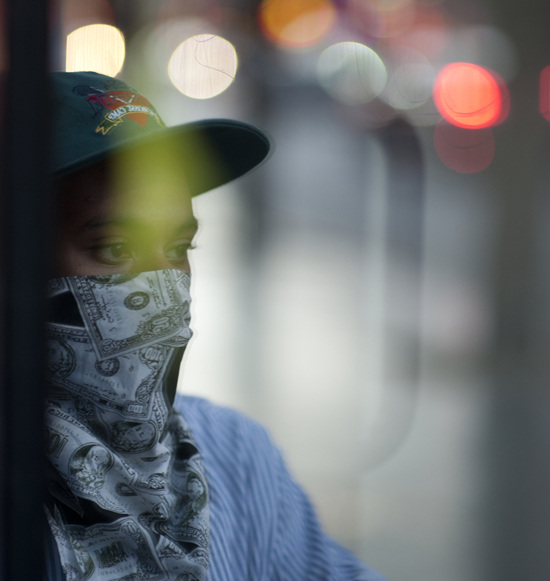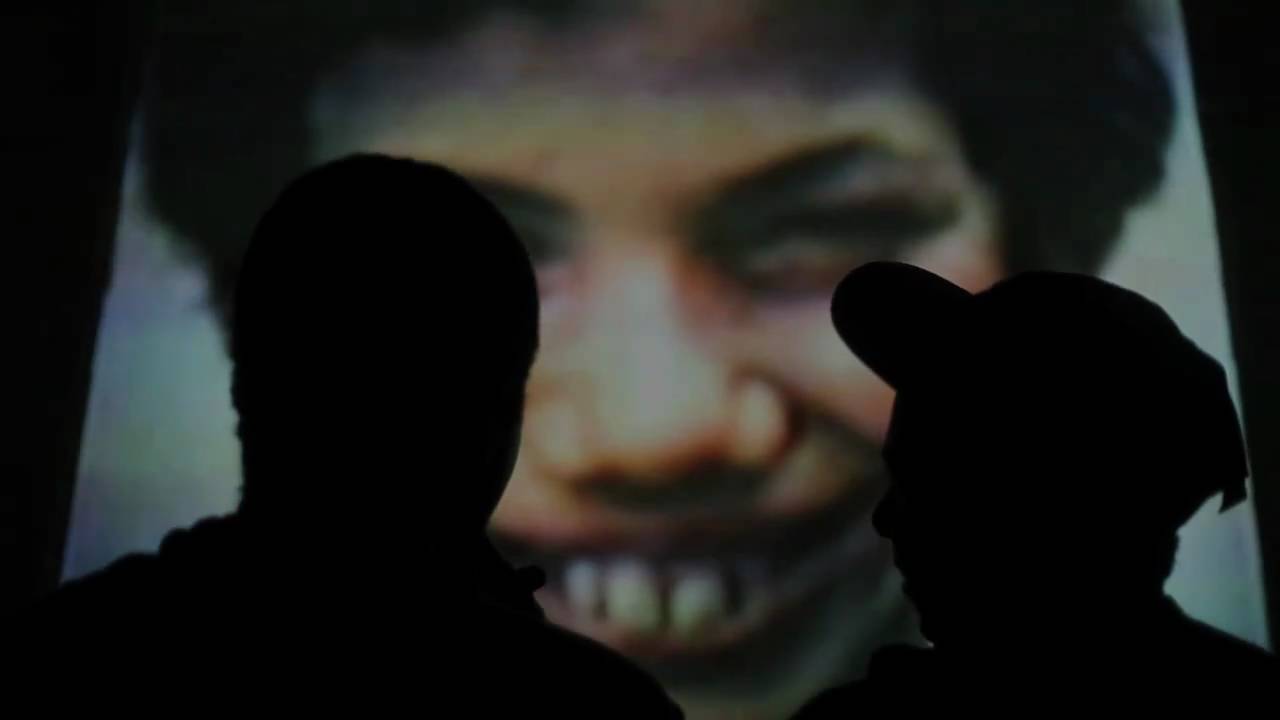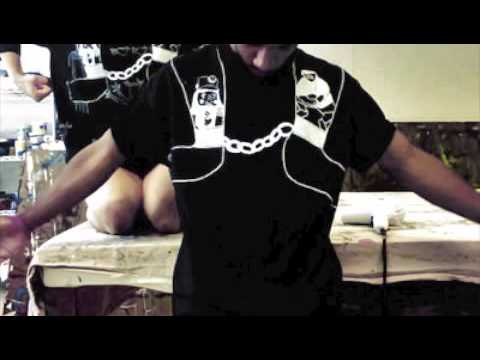"So what y’all wanna do? Wanna be rappers?" Brainfeeder artist Jeremiah Jae asks rhetorically on ‘Money & Food’, the lead single from his imminent Raw Money Raps album. "The only way to do it is to turn up the swagger. Then you get some haters, and you asking ‘Why they mad for?’ We only want the money and the food, for the rappers and the dudes, you can all take two, cause I’m sick of all these bitch niggas spraying like fools, cause I’m only try’na to do what these niggas try’na do."
On the face of it, this argumentative monologue isn’t really any kind of a new battle in rap circles. There have been beefs far too legendary to even try and trivialize them as a brief example (ok, um, Jay-Z and Nas or Biggie and Tupac). But when you consider the medium through which Jae is saying this – in his lazy, multi-tracked drawl over a spiky prismic collage of a beat – he is breaking new ground, because it’s not really the kind of marriage you’d expect from any kind of diss track.
Technically though, it isn’t a war dub or the first punch in a clash or something like that. It isn’t anything of the sort. For a start, it’s not gunning for anyone in particular, but it also manages to say a lot about the personality of the Chicago born, LA based artist, in that he chooses to address clichéd rap topics (violence, guns, haters etc) in such a unconventional manner. It’s like unintentional osmosis, with hip-hop’s pomp filtering through Jae and emerging as more of a pondering. And ultimately, that’s where Jeremiah Jae finds himself – stuck between two worlds, acting as the filter between hip-hop and sound experimentation.
Blending his own mixture of surreal lyrics and his sample heavy, shaggy audio experiments, Jae ably produces the kind of wayward beats you’d expect from someone as flighty and as deeply talented as Madlib. But mainly he finds the space and time to sift through approaches, source material and layers of static, to shape his own soundworld.
"My thing with hip hop is that I think it’s a fairly experimental form already," Jae tells me over an aptly distorting Skype line that’s beaming from his home in LA direct to a damp Farringdon office block. "It’s also a fairly new genre if you think about it – like, there’s already so many formulas and styles and stuff. My thing is – and I even stick to a formula – but the large part of it is me trying to create a new formula and continue to be an experimenter.
"So when I’m making hip-hop music," he continues, "it’s the same with when you’re making a jazz composition or a classical piece of music. It’s just considering it as a musical form rather than a limited, formulaic, 4/4 time signature beat, because you can expand beyond that. I’m into expanding that basic hip-hop shit."
With tracks littering Raw Money Raps – his first album for Flying Lotus’ Brainfeeder label – peeking out from behind titles like ‘Guerilla (Evolution Pt. 1)’, ‘Man (Revolution Pt. 1)’ and ‘Hercules Versus The Commune’, even at face value it’s pretty obvious that Jae’s not likely to be working with the same subject matter as the next rapper you’ll hear on the radio. And that’s before you’ve even listened to tracks like ‘Seasons’, ‘Leaders’ and ‘Greetings’ – probably his most ‘rap’ cuts on the record. His vocals are also purposely smothered, smudged and melded into their surroundings, but sometimes the strength of his lyrical content lashes out and makes you forget all about how weird, or brave, or experimental his music can be.
"When using the voice as a texture, or in textural means, you can still bring the lyrics across – the lyricism is also important – but I didn’t wanna just stay with these superficial contexts and content," Jae theorizes later in our conversation. "A lot of mainstream music I listen to is appealing, in the way that the vocals do sound crisp and polished and, even though they’re rapping about some sort of club life or something like that, you’re engaged because everything sounds clean and clear."
"When I’m making stuff," he continues, "I’ve made different choices to use my voice differently with each track that I’m doing, instead of having this clean, same sound. In the same way as rock music and punk music; their types of voices vary so much, but in hip hop you kind of have to sound a certain way. I just want to use [my voice], like you say, as an instrument or a texture also."
If you flick through Jae’s Raw Money Raps album on random, you’re as likely to hear a Mexican guitar playing a jaunty samba or a weird sound-library experiment as you are a chunky 808 kickdrum or a slim slither of that conventional drum-backed hip-hop bombast. And while the material does jump and flit about in this weird, dreamlike, slow-motion paralyzed frenzy sometimes, it’s that wilful experimentation that makes Jae such an interesting artist. When his beats are good, they’re literally ‘listen to one on repeat for a whole day and still want to play them the first moment you get up in the morning’ kind of good. But it’s understandable that, through sheer diversity and sonic experimentation, he might be eliminating a section of his possible audience – or simply just trying to do too much.
"You have to be realistic in those kind of situations. As an artist dealing with the business and sales and all that, I don’t really try to think about that stuff too much, but you also wanna make it good and something which is able to sell and reach a lot of people," Jae says, when pressed on his hopes for the album. "But more importantly for me, I like to make stuff that just resonates in the atmosphere. Like whether you hear it or not, you’ll feel it somehow…"
"It’s the same thing that if you’re on that side of the world and I’m on this side of the world," he continues, animated by both the humour and gravity of what he’s saying, "and you have a scientific breakthrough or something, its nobody else’s doing – but someone, somewhere, is going to catch it, just because the internet of consciousness that we live in is so vastly powerful. If you’re just thinking about making money, or thinking about just the physical realm and that aspect of things, I think you’ll… you’ll just be there, but if you’re thinking about the bigger picture and reaching more people just through the vibrations alone, I think that’s more mystical and cooler than being a star overnight."
It’s odd, because even though he puts so much of himself into it, he’ll go and say something like that. You can’t help but feel that there’s a whole other side to Jae than what he puts into his art, or the music he puts out, or what he lets you see over the course of one conversation. It’s not that he’s guarded. On Skype he’s calm almost to the point of chill. He takes the time to properly answer the small, feeling-each-other-out type questions as much as he does the vast and impossible ones and, yes, the residing impression he leaves is that he’s perfectly content just doing music everyday, admitting a bunch of times in our conversation that he doesn’t really go out, or hang out, or party all that much. I get the feeling you could ask him a whole rack more probing questions, but it would still feel like you’re only ever just scratching the surface – like there’s a player, an experimenter, a thinker, a stoner, a writer, a fanboy, a poet, an artist and a hyperactive kid, all just waiting to come out.
Then there’s the matter of him channelling his dreams into his music. He told RA <a href="http://www.residentadvisor.net/feature.aspx?1465" http://www.residentadvisor.net/feature.aspx?1465 target="out">last year that his subconscious communications would be a "central theme of the album", with the record aiming to "bridge between the waking life and the dream world". In a way, he does tackle that all-too-familiar process of continually trying to make sense of those random communications your dreams throw at you. It’s a topic Jae’s spoken out about before and, to be honest, the above quote is likely to appear in some form in a high percentage of Raw Money Rap‘s reviews, because it’s an easy assumption to make: that the jumbled messages and luminescent lyrical content that seemingly fall out of nowhere, or a weird stoned lullaby like ‘False Eyes’, are completely otherworldly or unconscious in their union. Personally, after living with the record for weeks and talking to him, I’d like to think it’s more than that concept – that the arrangements and flow of the album really do reflect something, or some number of potent cerebral and artistic characteristics, within Jae himself.
"It’s grown in different ways," he offers when asked about dream translation. "I think the main reason for that is because I don’t record in studio settings or with engineers, or where there are a lot of other people in the room. It’s just in a clear space with my thoughts becoming clear. It’s like meditation, where you just trying to connect with your inner voice more. Yeah, a lot of it is a bunch of random communication, but it all relates to you if you can really look at it and analyse it. It’s not that you can analyse your dreams and write them down or whatever, I think you can get a lot of confusion from that. But if you know how to direct it, and if you trust in the overall visions of your dreams, then it’ll work out. Not everybody goes and takes that route, but I had a lot of fun doing it that way."





